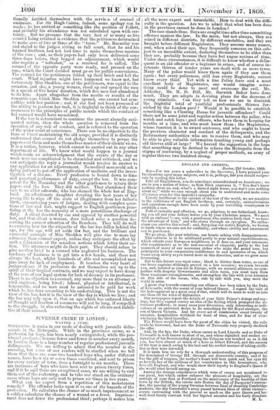JUVENILE CRIME IN LONDON; WANTED A CURE.
SOMETHING is amiss in our mode of dealing with juvenile delin- quents in the Metropolis. 'While in the provinces crime as a profession for boys, has been nearly extinguished, while the pro- vincial graduates become fewer and fewer in number every month, in London there is a large number of regular professional juvenile delinnents. We are willing to admit that the number is de- creasing, but some of our readers Will be startled when we tell them that there are some two hundred boys who, under different names, have been six or seven times convicted, and sent to prison for every variety of term, from a fortnight to six months. There are instances of boys who have been sent to prison twenty times, and if it be said these are exceptional cases, we are willing to eat them out of the reckoning, and to take our stand on the ordinary cases where boys are only sent to prison six times in two years. What can we expect from a repetition of this monotonous remedy? The Offender looks upon it as one of the hazards Of the profession. He calculates the Chance of so much imprisonment as a soldier calculates the chance of a wound or a fever. Imprison- ment does not deter the professional thief; perhaps it makes him
all the more expert and formidable. .How to deal with the diffi- culty is the question. Are we to admit that what has been done in the provinces cannot be done,in London?
The case stands thus. Boys are caught time after time committing offences against the law. In the main, but not always, they ale seized in different districts, by different constables,- and they are brought before different Magistrates. They assume many- namee, and; when asked their age, they frequently romance on this sub- ject to an incredible extent, declaring themselves to be older than they are probably because they have but vague notions of time. Uniler these circumstances, it is difficult to know whether a delin- quent is an old offender or a beginner in crime, and of course in- veterate thieves of tender years are dealt with as mere tyros. Many of the police would know them again if they saw them again; but every policeman; still less every Magistrate, cannot know every thief. Yet with a fine Police force and a most excellent body of Magistrates, one would imagine some- thing could be done to meet and overcome the evil. Mr. Adderley, Mr. M. D. Hill, Mr. Barwick Baker have done much. They are adepts in devising plans for the decrease of young criminals. Can they tell us how we are to diminish the frightful total of youthful professionals thieves fur- nished by the London pave ? Would it be possible to establish something like a Clearing House for juvenile offenders ? Could there not be some joint and regular action between the police, who watch and catch boys ; gaol officers, who have them in keeping for months at a time, and who must know them ; the Magistrates, whose function it is to award sentences, and who ought to know the previous character and conduct of- the delinquents, and the Reformatory authorities who are to receive them, and who may be able to give valuable information touching young and perhaps old thieves still at large ? We hazard the suggestion in the hope that something may be devised to relieve the Metropolis from the stigma of nurturing, by a neglect of proper methods, an army of regular thieves two hundred strong.


























 Previous page
Previous page